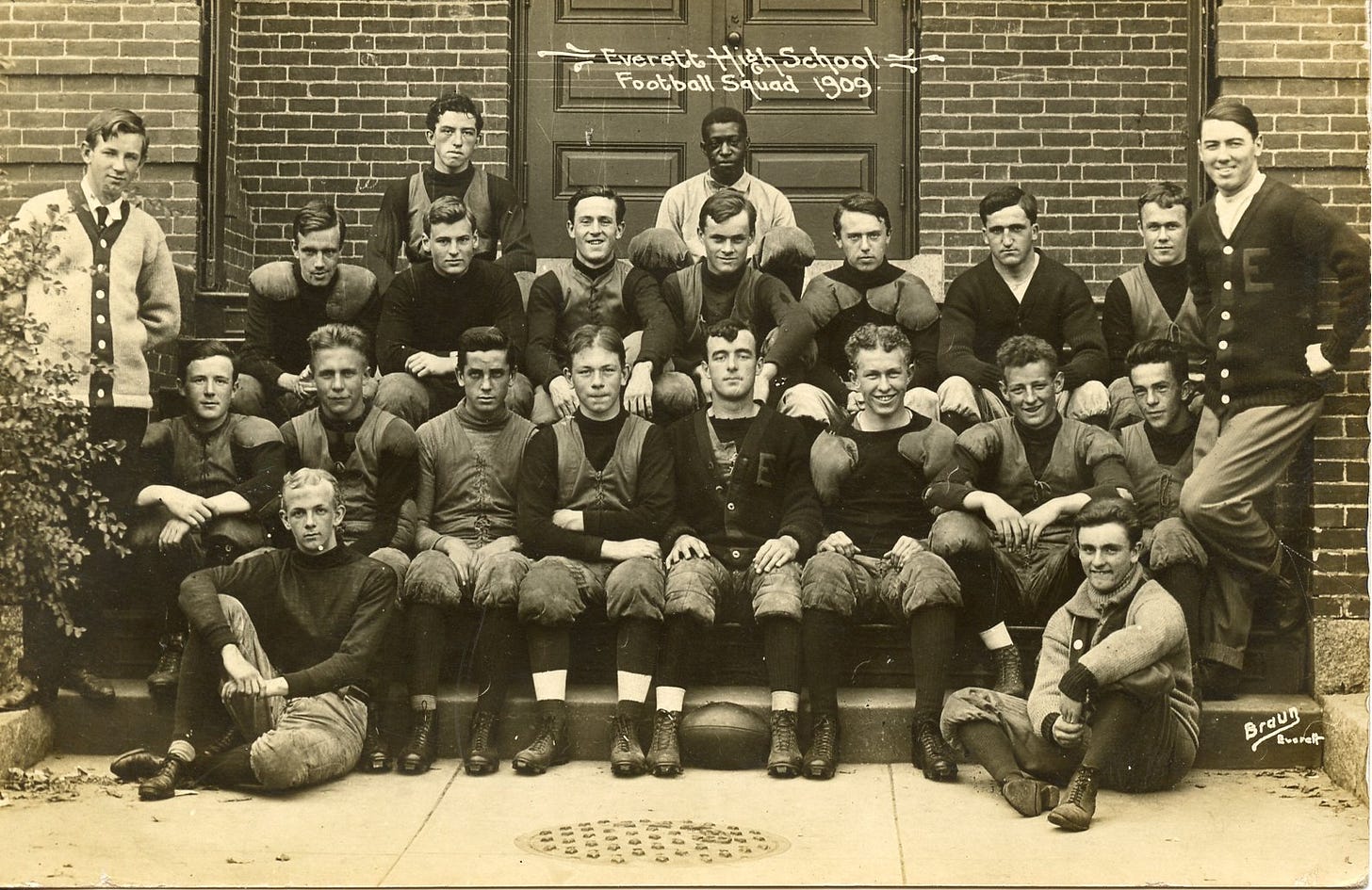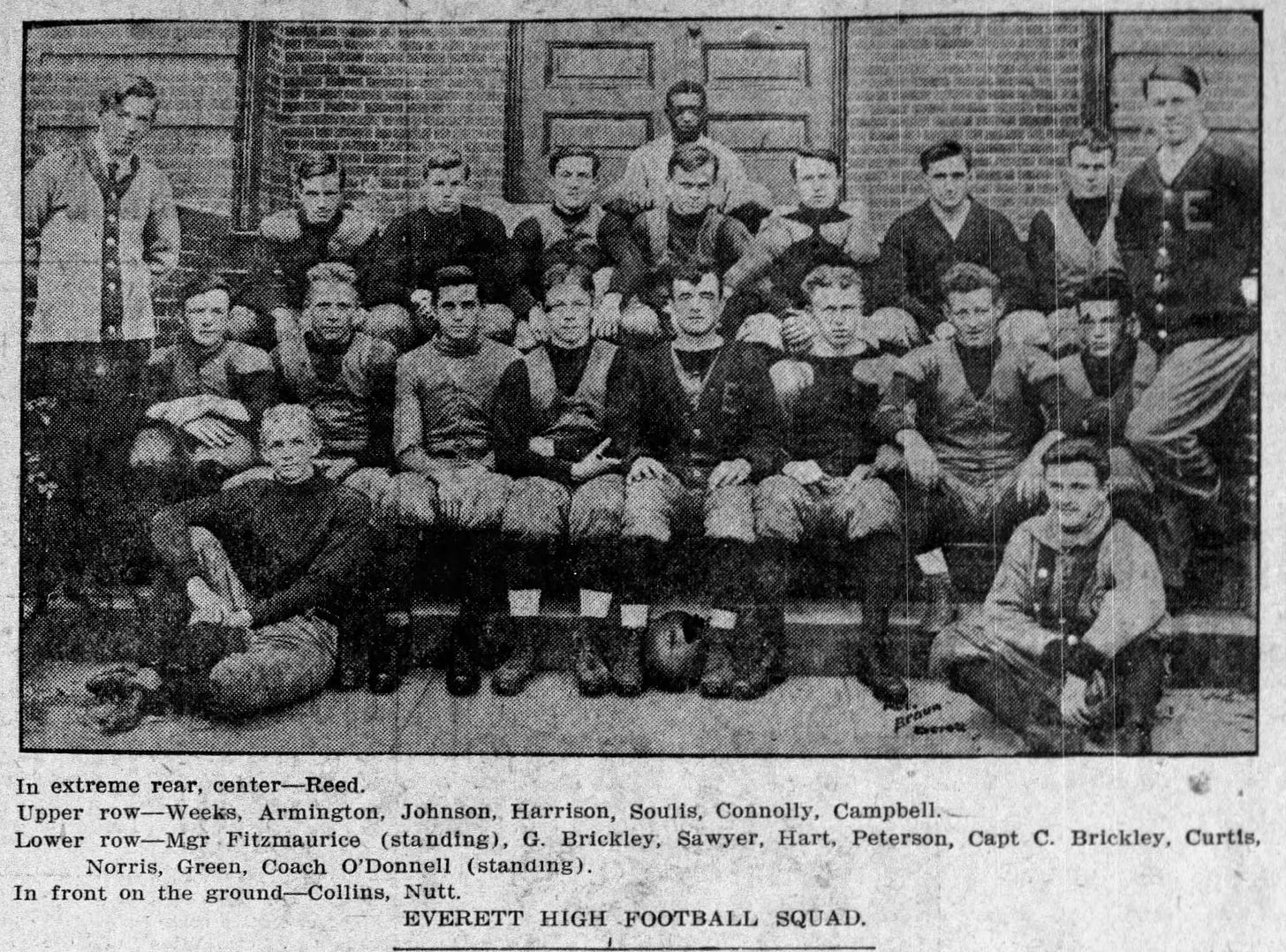Today's Tidbit... The 1909 Everett (MA) High School Football Team
Everett High School in Massachusetts had an interesting team in 1909. The school was a football power, winning state championships in 1896, 1897, and 1899 and feeding football players into top Eastern colleges, so I was glad to acquire the real photo postcard (RPPC) shown below. I was equally excited to find a nearly identical image in a Boston Globe article from that year. Even better, the image caption identifies everyone in the picture. (The newspaper image is missing the second person seen in the top row in the RPPC.)
Much of the fun part of this image comes from the athletic careers of four people included in this picture. One is the team captain.
In most team pictures of the day, the captain sat in the middle of the first or second row, holding a football painted with the year or the team's primary achievement. It so happens that the 1909 Everett High School captain was Charles Brickley, seen with the ball resting on the cement between his feet. Brickley's name causes little excitement among today's football fans, but he was a fan favorite and premier player just before college football's golden era.
Brickley was a two-time consensus All-American fullback at Harvard in 1913 and 1914, when the fullback was football's glory position. Ol' Chuck ranks among the game's top drop kickers, setting national records for most field goals in a season (13) and career (34), and he famously dropkicked five field goals in Harvard's 15-5 victory over Yale in 1913. Brickley later coached several college teams and formed the New York Brickley Giants, an NFL team in 1921.

Another player on the Everett team that succeeded was Brickley's brother, George, seated on the far left in the same row as Charles. Three classes behind Charles, George, graduated from high school in June 1913, signed with baseball's Philadelphia Athletics, and had his major league debut in September. After his pro baseball career ended, he played football at Trinity College and for the Hammond Pros, Cleveland Tigers, and the New York Brickley Giants.
Standing on the far right, their coach, Cleo O'Donnell, played at Holy Cross before taking over at Everett in 1909. In his seven years there, the team went 68-8-6, including a twenty-five-game stretch during which their opponents did not score a point. The 1914 team went 13-0, outscoring opponents 600-0 and beating the Chicago area’s Oak Park in the national championship game by an 80-0 score. Then, O'Donnell took the Purdue job and was winless in two years of Big Ten play. He returned East, where he successfully led Holy Cross for eleven years and St. Anselm for six.
The other intriguing individual is Matthew Bullock, an assistant coach, who sits in the middle of the top row. Previously profiled here, Bullock played at Everett, captaining the 1899 team. After graduating, he became Dartmouth's first Black football player and was a member of the team that defeated Harvard in the first game played in Harvard Stadium in 1903. After leaving Dartmouth, Bullock attended Harvard Law and coached UMass football on the side, making him the first Black coach of an integrated college team. He later coached Morehouse and Alabama A&M but spent most of his career as a lawyer, assistant state attorney general, and in other government roles.
There may be others pictured who had athletic or other success after leaving Everett High. Of course, if you know, comment below.
Football Archaeology is reader-supported. Click here to buy one of my books or otherwise support the site.







Thanks for adding to the story. I was aware of his issues as a stock broker, but did not know about the "hiccups" in the title game.
You've zeroed in on quite an aggregation. But there may be even more to the story, as I relate in my book, "The Coach Who Strangled the Bulldog: How Harvard's Percy Haughton Beat Yale and Reinvented Football." In 1999, the Boston Globe named Brick (arguably the greatest dropkicker in football history) the greatest Massachusetts high school football player of the 20th century--beating out, among others, future Heisman winners Angelo Bertelli, Joe Bellino and Doug Flutie. (Had there been a Heisman in 1913, Brickley would have won it.) However...when Brickley and Everett faced Somerville in the 1909 state title game, the 10,000 in attendance saw a bizarre 11-10 Everett loss As I note, "the play-by-play offers several developments that make a modern reader wonder if the fix was in--and Brickley was in on it."
Per The Boston Globe: "Everett's inability to kick a goal after its first touchdown also counted against it. Norris punted out well, but Capt. Charles Brickley was nervous after catching it, and he missed the goal by a few yards...Capt. Charles Brickley broke through. the right side of the line, and, with a clear field, he dropped the ball....Charles Brickley tore off a 17-yard run and would have scored had he not stumbled....Capt. Brickley dropped back for a goal from placement from the 25-yard line. He missed by many yards."
Twenty years later, Brickley would be convicted of stock manipulation and serve time in jail. His reputation never recovered, and he is not in College Football Hall of Fame.